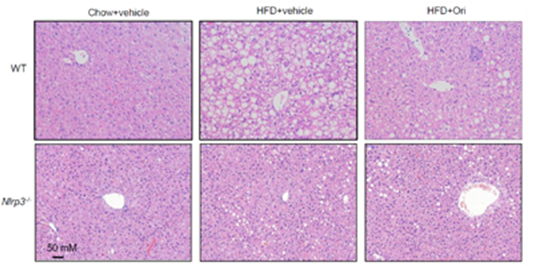ZHOU Rongbin, JIANG Wei from Hefei National Laboratory for Physical Sciences at Microscale with DENG Xianming from Xiamen University showed that Oridonin (Ori), the major ingredient of a tradition Chinese herb, is a specific and covalent inhibitor for NLRP3 inflammasome. The research is published in Nature Commuication.

A microscopic view of tissue. (Image by the research group)
NLRP3 inflammasome is a multiple protein complex composed of innate immune sensor NLRP3, ASC, and caspase-1. The aberrant NLRP3 inflammasome activation contributes to the progress of several human diseases, such as T2D, atherosclerosis, Gout, and neurodegenerative diseases. Hence NLPR3 is a very important target to intervene the diseases above.
However, no clinical medicine targeting to NLPR3 has been found. The inhibitor to NLPR3 has gain much attention in both industry and academia.
In this study, scientists showed that Ori can target NLRP3 to exert its anti-inflammatory activity. On covalently binding to Cys279, Ori blocks the NLRP3–NEK7 interaction and the subsequent NLRP3 inflammasome assembly and activation, leading to an effective suppression of NLRP3-related diseases.
It is predicted that Ori may serve as a lead for developing new medicine against NLRP3-driven diseases like Type-2 diabetes (T2D) and gouty arthritis, which may assist those who are suffering from these diseases.
(Written by LYU Jinghao, edited by HUANG Danning, USTC News Center)